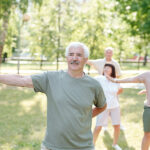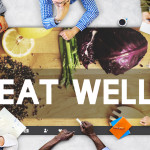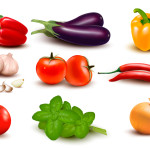By Bonnie Jenkins
My gym buddies and I are gearing up for our town’s annual 5k race to raise money for breast cancer. My grandmother died from the disease and I have various cousins and aunts who have battled it, too. But it’s not just my family that is plagued by this potential killer. According to the American Cancer Society, one in eight women will develop breast cancer at some point in their lives.
Even if a woman has several risk factors—family history, advancing age, race (Caucasians are at more risk) or having dense breast tissue—how she lives her life is what really counts. Here are several natural strategies to help lower your breast cancer risk.
First, get moving. Even if you aren’t up for a 5k, exercise improves lymph circulation (which helps remove toxins from the body) and aids in maintaining a healthy weight. Physical activity has a direct action on breast cancer by balancing reproductive hormones, especially estrogen, and by increasing your sensitivity to insulin. According to researchers at the National Cancer Institute, getting at least three hours of physical activity per week can lower the risk.
It’s also important to adopt a cancer-fighting diet. Cultures that eat a primarily vegetarian diet have the least amount of breast cancer. That doesn’t mean you need to give up meat completely. What it does mean, however, is that you should eat lots of vegetables, fruits, whole grains and beans. Those foods are rich in antioxidants and dietary fiber which is linked to decreased incidence of breast cancer.
Certain foods are especially good at preventing breast cancer. These include flaxseed and fish high in omega-3 fatty acids (salmon, tuna, sardines, mackerel and herring), cruciferous vegetables (broccoli, cauliflower and Brussels sprouts), mushrooms (shiitake and maitake), and onions. Avoid highly processed foods and nutritionally-deficient carbs like white bread and potatoes. Women consuming the highest glycemic index diet have a 44 percent greater risk of developing breast cancer than those eating a low-glycemic diet, Swedish research shows.
Finally, certain nutritional supplements can offer protection. One large study of 88,000 women links higher intakes of vitamin D with significantly lower breast cancer risk in premenopausal women. Found in cabbage family veggies, indole-3 carbinol (I3C) appears to keep harmful free estrogen molecules from joining with estrogen receptor sites on breast cells. It also promotes production of estriol, considered the “good” estrogen.
The World's Quickest Solution for Ending Prostate and Urinary Misery
This has recently been revealed to be one of the only real breakthroughs in prostate health.
The seeds of a strange fruit (sometimes called "Chinese Apples") hold powerful phytonutrients that are a revolution in prostate health.
In fact, UCLA and Veterans Administration research have now proved this to be true.
Not only that, but it may be the worlds quickest solution for ending prostate misery.
Simply stated, these phytonutrients represent a huge step beyond beta sitosterol, saw palmetto, and other phytosterols alone.
Simply click HERE if you want to have fast prostate relief...restful, uninterrupted sleep...no more constant "urges to go"...enhanced virility...and optimal prostate support for life.
It’s also wise to reverse unhealthy gut flora by supplementing with probiotics and calcium-d-glucarate, which binds with estrogen and harmful toxins so the body can properly excrete them.
Essential for brain function and memory, phosphatidylcholine may also stall the spread of breast cancers cell by boosting immune function. And don’t forget green tea, which is an excellent source of protective polyphenols. Try drinking four or more cups of freshly brewed green tea each day. If that isn’t doable, opt for 1 to 3 capsules of a standardized green tea extract that contains 40 percent catechin and 60 percent polyphneols. Astragalus, curcumin (found in the spice turmeric) and rosemary may offer breast protection as well.
It would be wonderful if we could all walk our way to a cure. Unfortunately, a cure for breast cancer doesn’t seem to be coming any time soon. In the meantime, we can all take the steps necessary to protect against this killer disease that affects so many of us.
References:
Ballard-Barbash R. Physical activity, weight control, and breast cancer risk and survival: clinical trial rationale and design considerations. Journal of the National Cancer Institute. 2009;101:630-643.
Crew KD. Association between plasma 25-hydroxyvitamin D and breast cancer risk. Cancer Prevention Research. 2009;2:598-604.
Kendall CW. The glycemic index: methodology and use. Nestle Nutrition Workshop Series. Clinical & Performance Programme. 2006;11:43-53.






